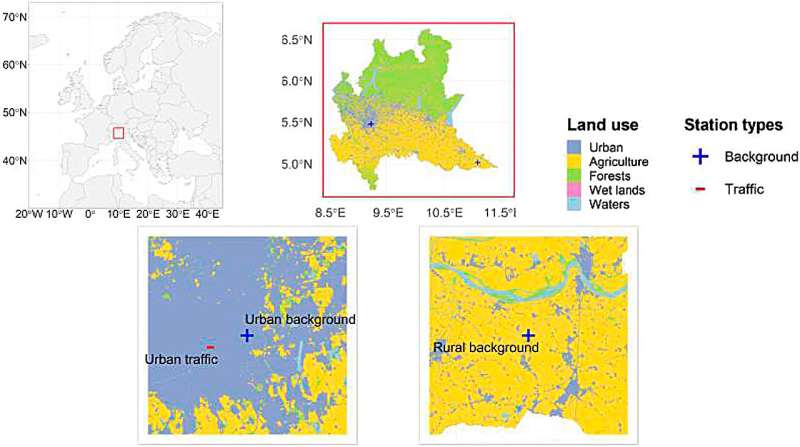This article has been reviewed according to Science X's editorial process and policies. Editors have highlighted the following attributes while ensuring the content's credibility:
fact-checked
proofread
Studies investigate the impact of agriculture on air quality in Lombardy

In the wake of the 2020 COVID-19 lockdowns, researchers in northern Italy noticed that notwithstanding the partial suspension of travel and industrial production in the region, the level of particulate matter in the atmosphere remained high.
This is significant as air pollution, especially particulate matter, is one of the planet's main environmental health concerns and policies that address particulate matter tend to focus on transport and industry, even though there is growing evidence that agriculture plays a significant role.
As part of the INHALE project, in collaboration with the Italian non-profit organization Legambiente Lombardia and Bocconi University, CMCC researchers have conducted a series of studies that seek to assess the extent of human health impacts from agriculture activities in the Po Valley so as to assess the dominant pollution regimes and possible air quality improvements from hypothetical emissions reductions.
In a study, titled "The formation of secondary inorganic aerosols: A data-driven investigation of Lombardy's secondary inorganic aerosol problem" in Atmospheric Environment, CMCC researchers drew on the predictive power of machine learning models and exploited the reduction in non-agricultural emissions during the lockdown to investigate the complex relationship between ammonia, nitrogen dioxide, and secondary inorganic aerosol concentrations.
The study concludes that agriculture is the main producer of ammonia emissions in the Po Valley and that it therefore contributes substantially to the formation of secondary particulate matter and the deterioration of air quality. These conclusions indicate that, in order to improve air quality, policies must address the simultaneous reduction of particulate matter precursors: ammonia and nitrogen oxides.
"From a scientific perspective, the contribution of agriculture to air pollution in the Po Valley is clear. This study provides evidence that the sector needs to be part of a broader air quality strategy," says Francesco Granella, postdoctoral researcher at CMCC and lead author of the study.
Further adding to our understanding of the impact of agriculture on air pollution, another study titled "Impacts of agriculture on PM10 pollution and human health in the Lombardy region in Italy," assesses the impact of agriculture on PM10 pollution. This study appears in Frontiers in Environmental Science.
"We were able to show that the spreading of manure in Lombardy contributes to the deterioration of air quality in winter, as ammonia is released into the atmosphere," says Stefania Renna, visiting researcher at CMCC, Ph.D. student at the Polytechnic University of Milan and leader of the study which also relied on ARPA Lombardia for its data.
"This research sheds light on how to more effectively reduce secondary inorganic PM2.5, unlike the existing literature, it is exclusively based on ground monitored data," says Lara Aleluia Reis from CMCC.
CMCC was leader of both studies and a partner in the INHALE project.
More information: Francesco Granella et al, The formation of secondary inorganic aerosols: A data-driven investigation of Lombardy's secondary inorganic aerosol problem, Atmospheric Environment (2024). DOI: 10.1016/j.atmosenv.2024.120480
Stefania Renna et al, Impacts of agriculture on PM10 pollution and human health in the Lombardy region in Italy, Frontiers in Environmental Science (2024). DOI: 10.3389/fenvs.2024.1369678
Provided by CMCC Foundation - Euro-Mediterranean Center on Climate Change


















